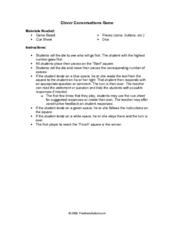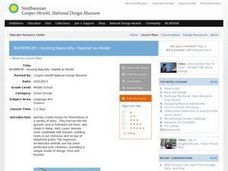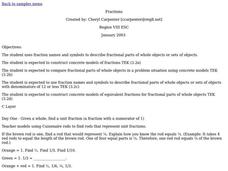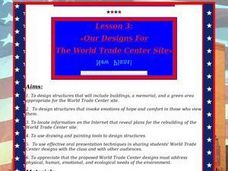Aquarium of the Pacific
Lego Molecules
Young scientists construct an understanding of molecular compounds in this hands-on science lesson plan. Using LEGO® to model the atoms of different elements, students build molecules based on the chemical formulas of common compounds.
Curated OER
Make a Solar Oven
Students build a solar oven. In this Science lesson, students construct a functional solar oven. Students design the oven and explain the energy concepts involved.
Curated OER
Survival Still
Lead your class to construct a solar still on campus to demonstrate how water can be extracted from the soil. The power of solar energy is emphasized, as is the concept of how capillary water can be recovered and purified by using a...
Curated OER
Atomic Structure and Ionic Bonding (A Visual Approach)
Using toothpicks, marshmallows, and round colored sticky dots, physical science enthusiasts build models of an atomic nucleus. In this eighth grade chemistry lesson plan, they play an atom-naming game with the models that they have...
Cornell University
Spectral Analysis with DVDs and CDs
Build a spectrometer to analyze properties of light. Scholars examine the spectrum from CDs and DVDs from two different light sources. Using the spectrum, they work to identify different elements.
Curated OER
Clever Conversations Game
Build social and conversation skills with a fun game! Special needs and children with autism can play this game to practice asking friendly questions and giving appropriate responses. After playing, have them ask one person a friendly...
Curated OER
BIOMIMICRY, Housing Naturally: Habitat as Model
Students explore natural animal habitats. In this lesson on biomimicry and habitation design, students will use classroom and field examples to examine animal habitats. Students will construct a model of a natural animal habitat. This...
Curated OER
Build an Anchialine Pond
Students explore biology by conducting a nature experiment. In this pond examination lesson, students utilize recycled materials, play-doh and water to recreate a pond and its inhabitants. Students identify the different elements within...
Curated OER
Same As
Explore the concept of the equals symbol. In this mathematical symbols lesson, learners discover the meaning of the equals sign (symbol). They also construct addition and subtraction sentences to understand the concept of equal parts.
Curated OER
Fractions
Young mathematicians use fraction names and symbols to describe fractional parts of whole objects or sets of objects. They construct concrete models of fractions, and compare fractional parts of whole objects in a problem situation using...
Curated OER
Decision Making a Mock Town Meeting on a Proposed Tank Farm
Young scholars identify the potential hazards to the water supply. In this ecology lesson, students role play a town hall meeting to discuss the proposal of a storage tank construction in their place. They present their arguments and...
Curated OER
Cornmeal with Powder Paint
Pre schoolers use art to build observational skills and eye-hand coordination. They squeeze art into a ribbon like shape on their paper, then sprinkle cornmeal and powder paint over it. They watch as water is sprayed on top of the...
Curated OER
3-D Cell Model
Life science laureates choose a plant or animal cell to construct a model of as an at-home project. This handout provides guidelines, suggested materials, and a grading rubric for their reference. A full-page letter to parents is also...
Curated OER
Start at the Very Beginning
Students explore ocean ecosystems. In this cross curriculum art and oceans lesson, students create a collage featuring three-finger algae using sand paper, tissue paper, and construction paper.
Curated OER
The Parts of a Tree
Students create a tree model. For this parts of a tree lesson, students read A Tree is a Plant, then discuss what trees are used for. Students use various materials to build and label their own tree.
Curated OER
Our Changing Community
Students investigate how communities grow and change. In this communities lesson, students discuss how their community has changed and construct a model of a community.
Curated OER
The Big Green Monster
Students practice rereading selected passages to improve their reading fluency. Working in pairs, students read and reread decodable, leveled passages. They complete center activities in groups of four in order to aid in decoding and...
Curated OER
Mountain Building
Teacher prepares four layers of Plasticine stacking layers on top of each other to create a model of how rocks within the earth can be folded creating anticlines and synclines below the surface and mountains and valleys on the surface.
Curated OER
Sentence Completion 16
Develop vocabulary in your high school native speakers or in advanced non-native speakers. THere are only six multiple-choice questions shown, but each contains more than one tricky vocabulary word. Example words include: oblivious,...
Curated OER
Coral Reefs, Polyps and Heads
Young scholars explore coral communities. They explore a coral polyp and build a coral head.
Key Curriculum Press
Triangle Inequalities
Properties about triangles are explored in this instructional activity. Geometers make conjectures about the length of a triangle's sides, the length of the angles in relation to the length of the sides, and the measure of the exterior...
Curated OER
Quadrilaterals
Students construct a variety of four-sided figures using a K'NEX Geometry Set. They view and discuss pictures of shapes, then in small groups they construct as many four-sided shapes as possible using the K'NEX Rods and Connectors. As a...
Curated OER
Our Designs For The World Trade Center Site
Learners design specific structures appropriate for the World Trade Center site. In this architecture design lesson, students use the Internet to research the original structures at the World Trade Center site and use painting or...
Curated OER
Families Around the World
Students discover the similarities and differences in families from around the world. In this multicultural lesson, students create their own family album and label each family member. There are suggested activities such as investigating...

























